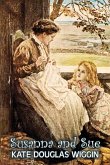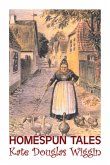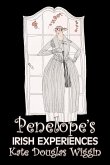Mrs. Bird thought, as the Christmas music floated in upon her gentle sleep, that she had slipped into heaven with her new baby, and that angels were bidding them welcome. But the tiny bundle by her side stirred a little, though it was scarcely more than the ruffling of a feather; and she awoke, drew the baby closer and listened to the voices outside brimming with joy: "Carol, brothers, carol, Carol joyfully, Carol the good tidings, Carol merrily!" "Why, my baby," whispered Mrs. Bird in soft surprise, "I had forgotten what day it was. You are a little Christmas child, and we will name you 'Carol' -- mother's little Christmas Carol!" Kate Douglas Wiggin (1856-1923), author of such works as Rebecca of Sunnybrook Farm, Penelope's English Experiences and A Village Stradivarius, was one of America's most popular writers of books for young people.








